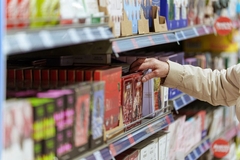
- Industry news
Industry news
- Category news
Category news
- Reports
- Key trends
- Multimedia
- Journal
- Events
- Suppliers
- Home
- Industry news
Industry news
- Category news
Category news
- Reports
- Key trends
- Multimedia
- Events
- Suppliers
China halts health tests and disinfection of imported frozen foods as COVID-19 controls ease

04 Jan 2023 --- China is to relax its testing on imported frozen and chilled products lowering the costs for exporters. As confirmed by the country’s customs authorities and State Administration for Market Regulation, the COVID-19 controls on foods will end on January 8 after more than two years of the restrictive measures being in place.
Moreover, the imported foods will not need to go through centralized warehouses where disinfecting and testing are carried out before imports finally reach the countries’ markets.
“While the time and cost burden for these testing and handling procedures have fallen mostly on importers, these announcements are definitely welcome news for the US industry. Easing the burden on importers and distributors will help product flow more smoothly and efficiently,” Erin Borror, VP of economic analysis, US Meat Export Federation, tells FoodIngredientsFirst.
Food safety concerns
As China abandons its zero-COVID policy and relaxes health control measures, the viability and contagion of the disease through food continues to be unclear.
There are few studies on the viability and removal of SARS-CoV-2 contaminating food. However, a study published in the Food Microbiology journal revealed the half-life of SARS-CoV-2 at 20 °C was 3–7 hours but increased to between 24–46 hours at 4 °C and exceeded 100 hours at −40 °C. SARS-CoV-2 persisted longer on chicken or salmon than on lettuce.
 Exporters will save money as food will not need to go through centralized warehouses where disinfecting and testing is carried out.Treatment with 70% ethanol for one minute, inactivated 3.25 log reduction of SARS-CoV-2 inoculated on lettuce but not on chicken and salmon.
Exporters will save money as food will not need to go through centralized warehouses where disinfecting and testing is carried out.Treatment with 70% ethanol for one minute, inactivated 3.25 log reduction of SARS-CoV-2 inoculated on lettuce but not on chicken and salmon.
ClO2 inactivated up to 2 log reduction of SARS-CoV-2 on foods while peracetic acid was able to eliminate SARS-CoV-2 from all foods.
Subdued food prices
After an intense food inflation rally that saw prices soar from an annualized rate of -3.9% in February to 8.8% in September, Chinese authorities have managed to control the country’s inflation rates, with food prices accelerating this November (compared to 2021) by 3.7% – compared to 17.86% in the Eurozone, 16.4% in the UK and 10.6% in the US.
The intense and hands-on market intervention of the pork market tamed the yearly 100% inflation on pig prices, cutting it to 22.5% for the first week of December compared to one year earlier, according to official data.
The country released, until the end of October, a record 107,100 metric tons of pork in six batches, flooding the market and effectively lowering prices.
Borror predicted previously for FoodIngredientsFirst the decline of pork prices in the country as the cyclical nature of the commodity prices and government intervention came into effect. Borror also forecasted that meat imports in the country would increase by the end of the year, which would further alleviate meat prices in the Asian nation.
Borror also affirmed pork prices will continue to decrease in the country in 2023.
By Marc Cervera











